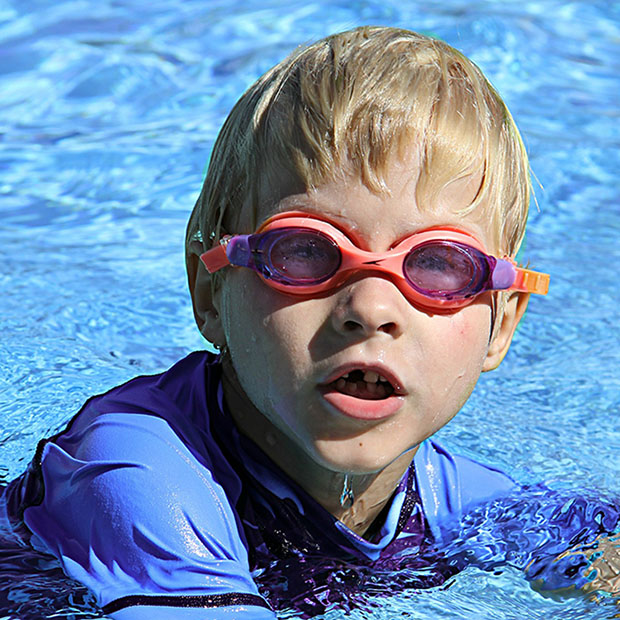Eye Safety Considerations for Swimmers

Before diving into the pool this summer, make sure you’re aware of the eye safety facts.
What can we do to protect our eyes while we cool off in the pool or have a swim in a lake? What are we protecting our eyes from anyway?
Eye Irritants in the Water
If you’ve ever felt a burning, stinging sensation after opening your eyes underwater at a public pool, then you’ve felt the burn of chloramine. This is a compound that forms when chlorine reacts with contaminants like dirt, oils, and urine. It sounds pretty gross, but chlorine is great at killing harmful bacteria so that the water is safe to swim in. Chloramine only causes mild, temporary irritation to the eyes in most cases. Poor pH balance in the pool can also cause irritation.
Don’t Forget Your Goggles
An easy way to skip the sting is to wear goggles while swimming! Choose a pair that fits properly so that it can form a good seal over your eyes. If you wear glasses or contacts, you could even get fancy and go for a pair of prescription goggles to help you enjoy the underwater view!
Leave Those Contact Lenses at Home
We know what you’re thinking: why not just wear normal goggles over my contacts instead of buying prescription goggles? As logical as that solution might seem, it does come with risks. Chlorine kills most of the microorganisms in water, but it doesn’t get them all. The ones that are left still shouldn’t be a problem. However, when you wear contact lenses while swimming, they act as Petri dishes for these microorganisms, which need a warm, moist environment to multiply.
One such microorganism is acanthamoeba, which lives in just about every body of water on the planet. We don’t really need to worry about these microscopic critters most of the time, but wearing contact lenses while swimming can lead to acanthamoeba keratitis, which can do serious damage to the cornea and even cause permanent blindness.
Aside from the risk from microorganisms, contacts simply aren’t designed for use underwater. They could fall out and get lost, or they could shrink and tighten around the cornea, causing irritation. We recommend leaving the contacts behind and sticking to glasses and goggles whenever you’re at the pool or participating in other water activities.
Need a Recommendation for Goggles?
There are a lot of goggles out there to choose from, but there’s no need to feel overwhelmed trying to find your perfect pair! Just give us a call or stop by the practice and we can give you a few recommendations. We don’t all have the same swim gear needs, but we do all need good protection for our eyes!